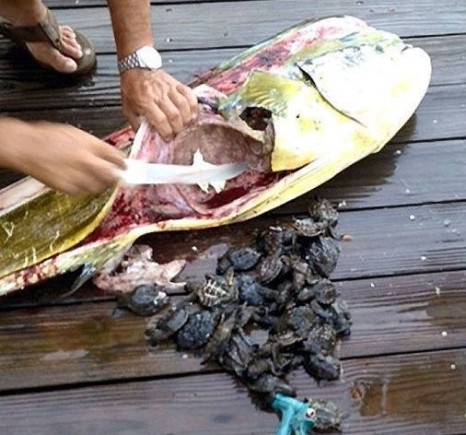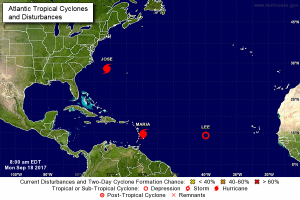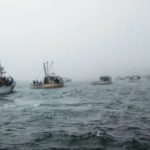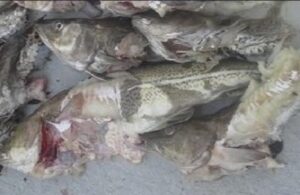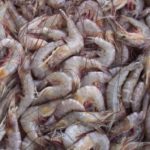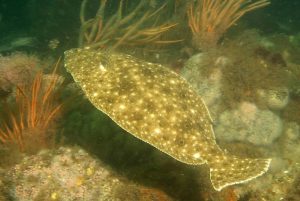Search Results for: center for biological diversity
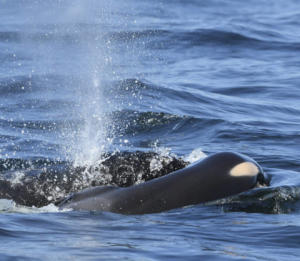
Center for Biological Diversity sues Trump administration to expand protected Southern Resident orca habitat along West Coast
The Tucson, Arizona-based Center for Biological Diversity said as it filed the lawsuit in U.S. District Court in Seattle.,,The lawsuit says the National Marine Fisheries Service has failed to act on the center’s 2014 petition to expand habitat protections to the orcas’ foraging and migration areas off the coasts of Washington, Oregon and California — even though the agency agreed in 2015 that such a move was necessary. The center says the protections would help reduce water pollution and restrict vessel traffic that can interfere with the animals.“ click to read<16:36
Center for Biological Diversity offended by F&WS – NMFS ESA Proposal
 The two federal agencies tasked with listing endangered species jointly proposed to revise the Endangered Species Act’s petition process, but conservationists are not happy. The proposal published Thursday by the Fish and Wildlife Service and the National Marine Fisheries Service would make the best use of available resources, increase “stakeholder engagement” and improve transparency, according to the agencies’ announcement. Calling the move “boneheaded,” the (CBD), a frequent petitioner and litigant,,, Read the rest here 19:40
The two federal agencies tasked with listing endangered species jointly proposed to revise the Endangered Species Act’s petition process, but conservationists are not happy. The proposal published Thursday by the Fish and Wildlife Service and the National Marine Fisheries Service would make the best use of available resources, increase “stakeholder engagement” and improve transparency, according to the agencies’ announcement. Calling the move “boneheaded,” the (CBD), a frequent petitioner and litigant,,, Read the rest here 19:40
Feds Reverse Course, Lift Ban on Fishing for Rare Pacific Bluefin Tuna – Center for Biological Diversity Distraught!
 “Bluefin tuna have been decimated by overfishing, and the world has called in their Pacific bluefin tuna fleets — but California fishermen continue to catch endangered Pacific bluefin tuna,” said Catherine Kilduff with the Center for Biological Diversity. “The Fisheries Service is supposed to protect fish on the path to extinction, not push them deeper into crisis. Yet that’s exactly what they’ve done.” Shut up Lady! Read the rest here 13:27
“Bluefin tuna have been decimated by overfishing, and the world has called in their Pacific bluefin tuna fleets — but California fishermen continue to catch endangered Pacific bluefin tuna,” said Catherine Kilduff with the Center for Biological Diversity. “The Fisheries Service is supposed to protect fish on the path to extinction, not push them deeper into crisis. Yet that’s exactly what they’ve done.” Shut up Lady! Read the rest here 13:27
Center for Biological Diversity to sue NMFS to Protect Disappearing Pinto Abalone From Ocean Acidification, Climate Change and Poaching
 Sustainable. The tax drain of US taxpayers that pay for NMFS, CBD’s tax except status, and for frivolous lawsuits brought forth by the Bender and Bender of Environmental NGO’s. Apparently these nuts believe that NMFS should be sued over Ocean Acidification, Climate Change and Poaching? Read the press release here 21:42
Sustainable. The tax drain of US taxpayers that pay for NMFS, CBD’s tax except status, and for frivolous lawsuits brought forth by the Bender and Bender of Environmental NGO’s. Apparently these nuts believe that NMFS should be sued over Ocean Acidification, Climate Change and Poaching? Read the press release here 21:42
Center for Biological Diversity Legal Petition Seeks Ban on Pacific Bluefin Tuna Fishing
 SAN FRANCISCO— The Center for Biological Diversity today filed a legal petition urging the National Marine Fisheries Service to prohibit fishing for Pacific bluefin tuna, which has suffered a 96 percent decline since large-scale fishing began. Read more here 08:20
SAN FRANCISCO— The Center for Biological Diversity today filed a legal petition urging the National Marine Fisheries Service to prohibit fishing for Pacific bluefin tuna, which has suffered a 96 percent decline since large-scale fishing began. Read more here 08:20
Center for Biological Diversity Petition targets ‘rogue’ killings by Wildlife Services
 They say U.S. critter assassins work in secret, quietly laying traps, lacing food with poison, sniping at targets from helicopters. Few people know exactly how the hits go down; the methods are largely hidden. more@wapo 10:32
They say U.S. critter assassins work in secret, quietly laying traps, lacing food with poison, sniping at targets from helicopters. Few people know exactly how the hits go down; the methods are largely hidden. more@wapo 10:32
NRDC, Center for Biological Diversity file petitions – NMFS considers pinto abalone for endangered list
 A 6-inch Pacific Ocean marine snail prized for its delicate flavor and colorful shell will be considered for endangered or threatened species status. The National Marine Fisheries Service announced last week that it will conduct a status review for pinto abalone, which are found from Alaska to Baja California. more@sacbee 08:48
A 6-inch Pacific Ocean marine snail prized for its delicate flavor and colorful shell will be considered for endangered or threatened species status. The National Marine Fisheries Service announced last week that it will conduct a status review for pinto abalone, which are found from Alaska to Baja California. more@sacbee 08:48
Another Center for Biological Diversity lawsuit against NMFS? – Maybe they should be charged total cost if they lose
 SAN FRANCISCO— The Center for Biological Diversity today filed notice of intent to sue the National Marine Fisheries Service for the agency’s failure to act on a petition to protect the orange clownfish — featured in the movie Finding Nemo — and seven species of damselfish under the U.S. Endangered Species Act. These reef fish face severe threats from climate change, ocean acidification and the marine aquarium trade. more@treefrogland 15:25
SAN FRANCISCO— The Center for Biological Diversity today filed notice of intent to sue the National Marine Fisheries Service for the agency’s failure to act on a petition to protect the orange clownfish — featured in the movie Finding Nemo — and seven species of damselfish under the U.S. Endangered Species Act. These reef fish face severe threats from climate change, ocean acidification and the marine aquarium trade. more@treefrogland 15:25
Center for Biological Diversity criticize Coral protection plan delay – deal with it!
 The National Marine Fisheries Service announced Friday a final decision on whether to protect 66 corals as endangered species would be delayed until June 7. That will allow scientists to consider a substantial amount of new information that arrived in response to the original proposal. Miyoko Sakashita, oceans director at the Center for Biological Diversity. “These corals desperately need the safety net that only the Endangered Species Act can provide.” Prove it! more@sunsentinal 20:13
The National Marine Fisheries Service announced Friday a final decision on whether to protect 66 corals as endangered species would be delayed until June 7. That will allow scientists to consider a substantial amount of new information that arrived in response to the original proposal. Miyoko Sakashita, oceans director at the Center for Biological Diversity. “These corals desperately need the safety net that only the Endangered Species Act can provide.” Prove it! more@sunsentinal 20:13
Center for Biological Diversity “tree huggers,” Endangered Species Act bid has PROP partnership concerned it – 4,000 year history of taking care of its coral

The Pacific Islands Regional Ocean Partnership or PROP has great concerns over a proposed listing of 66 reef building corals under the Endangered Species Act (ESA). Calling the group “tree huggers,” Guam President Joseph Cameron Guam’ says PROP has a problem with that request because these people have never been to the pacific. continued@islandbusiness
The Center for Biological Diversity today filed a notice of intent to sue the National Marine Fisheries Service
 “Every single fish matters in keeping these rockfish from going extinct,” said Center attorney Catherine Kilduff. “Some rockfish can live to be 100 years old, so wiping out Puget Sound rockfish is like clearcutting an old-growth forest.” continued@commondreams
“Every single fish matters in keeping these rockfish from going extinct,” said Center attorney Catherine Kilduff. “Some rockfish can live to be 100 years old, so wiping out Puget Sound rockfish is like clearcutting an old-growth forest.” continued@commondreams
American Samoa – Center for Biological Diversity criticized
 In addition to voicing objections against the NOAA Fisheries for the proposal to list American Samoa corals under the Endangered Species Act, residents also complained about the organization that initiated the listing. Read more here
In addition to voicing objections against the NOAA Fisheries for the proposal to list American Samoa corals under the Endangered Species Act, residents also complained about the organization that initiated the listing. Read more here
Alaska – National Marine Fisheries Service rejects Center for Biological Diversity petition to list cold-water corals
A federal agency has rejected a petition seeking to list 44 cold water corals off Alaska as threatened or endangered. An environmental group says the corals are threatened by commercial fishing, ocean warming, acidification and oil spills. Read more here
Center for Biological Diversity, Oceana Inc and Turtle Island Restoration Sue the NMFS/F+WS (us) AGAIN! Loggerhead’s at the brink of extinctio………
The lawsuit said loggerheads were already being pushed to the brink of extinction and that the government had failed to comply with deadlines set under the Endangered Species Act to establish protected areas or “critical habitat” for loggerhead sea turtle populations. The suit, brought by the Center for Biological Diversity, Oceana Inc and Turtle Island Restoration, cited the destruction or degradation of nesting and foraging habitats, pollution including oil spills, climate change and sea level rise among other threats to the long-term survival of the marine turtles. Of course, “incidental capture, injury and death by commercial fishing fleets”. Read More
Commercial crabbers concerned about Center for Biological Diversity’s coral petition
“We’re terrified of the petition,” Linda Kozak, a fisheries consultant in Kodiak, told the Fisherman. “This could be another sea lion issue where just to be safe they close all the fishing to bottom contact gear.”
NOAA shelves turtle protection plans to require “turtle excluder devices” for small fishing operations-Center for Biological Diversity “critical”
“The information we now have suggests the conservation benefit does not justify the burden this rule would place on the industry. We need more research looking at different options,” Roy Crabtree, southeast regional administrator for NOAA Fisheries, said in a statement. The rules had been set to take effect by spring. Gulf of Mexico shrimpers had said the requirement could push them out of business. The change would have affected 2,600 fishermen, including an estimated 2,300 vessels in Louisiana. Crabtree said federal officials will continue their research to help prevent turtle deaths. http://www.thenewsstar.com/viewart/20121128/NEWS01/211280341/NOAA-shelves-turtle-protection-plans
Bay Area enviros target use of drift gill nets – litigation threat from Oceana, Center for Biological Diversity, Turtle Island Restoration Network
SANTA CRUZ – Calling them “curtains of death,” Bay Area environmentalists have put the federal government on notice that they intend to sue to halt the controversial use of drift gill nets for commercial fishing. Sometimes more than a mile long, the nets are used in the waters off California to catch shark and swordfish. But because they can sweep up unintended catch – including rare and endangered species such as sperm whales and leatherback sea turtles – environmentalists have long criticized their use. “Ultimately, what we’re trying to do is eliminate drift gill nets from being used off the California coast altogether,” said Dr. Geoff Shester, California program director for Monterey-based Oceana. “These are the lions and tigers of our blue Serengeti, but here we are allowing this fishery to continue.” The litigation threat comes from Oceana and the San Francisco-based Center for Biological Diversity and Turtle Island Restoration Network – groups that have pushed aggressively for everything from fishery changes to marine habitat protections to designation of the endangered leatherbacks as California’s official marine reptile. In operation since 1980, the drift gill net fishery has long been under fire from environmentalists. While allowed under federal law, both Oregon and Washington have banned them along their coasts. The National Oceanic and Atmospheric Administration said it was too early to comment on the potential suit, which would be filed under the Endangered Species Act. “We’re still evaluating it,” NOAA spokesman Jim Milburn said. In announcing the suit, environmentalists said they are concerned that two endangered sperm whales were caught by a drift gill net in December 2010. Based on,,,,,,,,Read More http://www.mercurynews.com/california/ci_21483913/bay-area-enviros-target-use-drift-gill-nets
Another Species, Another Center for Bio Diversity Petition To Prohibit Pacific Bluefin Tuna Fishing
 The National Marine Fisheries Service (NMFS) announces the receipt of, and request public comment on a petition for rulemaking under the Administrative Procedure Act. The Center for Biological Diversity, a non-governmental organization, has petitioned the U.S. Department of Commerce to promulgate regulations to prohibit fishing for Pacific bluefin tuna and to identify specific reference points used to determine if overfishing is occurring or if the stock is overfished. Read more here 12:27
The National Marine Fisheries Service (NMFS) announces the receipt of, and request public comment on a petition for rulemaking under the Administrative Procedure Act. The Center for Biological Diversity, a non-governmental organization, has petitioned the U.S. Department of Commerce to promulgate regulations to prohibit fishing for Pacific bluefin tuna and to identify specific reference points used to determine if overfishing is occurring or if the stock is overfished. Read more here 12:27
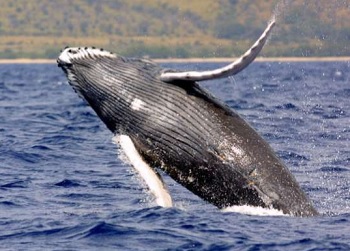
Federal fisheries service agrees to deal aimed at curbing whale entanglements in fishing gear
A legal agreement finalized Tuesday over the protection of humpback whales is expected to help the threatened animals thrive while maintaining the ocean’s health. The deal stricken between the National Marine Fisheries Service and Center for Biological Diversity will create a team to reduce the number of whales that get tangled in a West Coast federal fishery. The service will form the team by Oct. 31, 2025, a press release stated. A federal court in March sided with the center after it filed suit last year against the fisheries service. The center argued the service failed to protect Pacific humpback whales from getting entangled in sablefish pot gear off the California, Oregon and Washington coasts. >click to read< 09:33
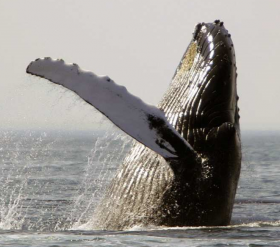
Whales win in federal fight over sablefish net permit
A federal judge has awarded summary judgment to environmental advocates over the National Marine Fisheries Service’s handling of endangered Pacific humpback whales that get tangled in fishing gear off the Pacific coast. U.S. District Judge James Donato ruled in favor of the Center for Biological Diversity, which sued the feds in 2022 over a permit that authorized the incidental taking of endangered humpback whales in a sablefish fishery without also putting plans into place to reduce the number of entanglements. The organization said the permit was unlawful because the service “did not first ensure that a take reduction plan for the whales had been developed or was being developed, as required.” >click to read< 11:05
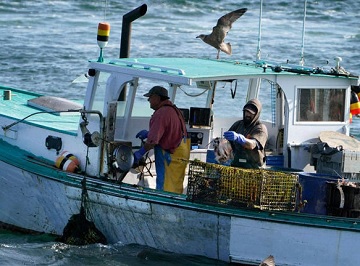
Green groups targeting blue-collar lobstermen are largely funded by dark money
Environmental groups that have led litigation targeting the lobster fishing industry have been heavily funded by various liberal dark money groups that don’t disclose their individual donors, a Fox News Digital review of tax filings found. For example, the Center For Biological Diversity has received millions of dollars from left-wing dark money groups including the Rockefeller Family Fund, the Patagonia Fund and Pew Charitable Trusts. The center has been the recipient of grants worth nearly $8 million from the Sandler Foundation, $1 million from the Wilburforce Foundation, $850,000 from Environment Now and another $815,000 from the Frankel Family Foundation, according to Influence Watch. Video, >click to read< 07:42

Green Groups Ignore Genuine Risks To Whales From Offshore Wind Farms
Environmentalists want to crack down on the Maine lobster industry in the name of protecting endangered whales, but they turn a blind eye to the greater threat to whales from proposed offshore wind farms. The irony is almost as delicious as the lobster dinners at stake. Green groups such as the Center for Biological Diversity and Defenders of Wildlife routinely target commercial fishing by claiming that it causes ancillary harm to marine species protected under the Endangered Species Act and other federal laws. This includes the North Atlantic right whale, whose population of only 350 or so migrates up and down the Atlantic Coast and can cross prime lobster territory off New England. >click to read< 11:52

Maine Lobstermen’s Association Statement on Recent Court Decision
On November 17, Judge James Boasberg issued a remedy order in the lawsuit, Center for Biological Diversity v. Raimondo. Following is a statement from Patrice McCarron, executive director of the Maine Lobstermen’s Association. “While the Court’s decision offers lobstermen some hope, it by no means resolves the issues facing our industry. We appreciate that the Judge recognizes the need to avoid massive disruption of the fishery, but the simple truth is lobstermen are still mandated to achieve a 90% risk reduction in 2 years which cannot happen without causing significant harm to the fishery. Please >click here to read the press release< 10:12
Maine Lobstermen’s Association Statement on Recent Court Decision
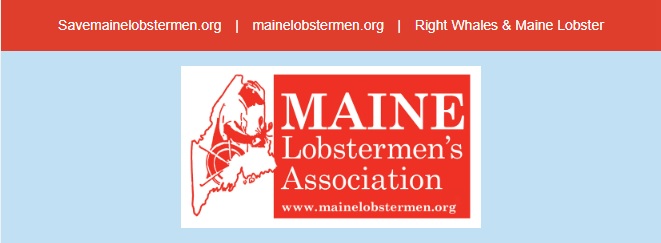 KENNEBUNK, Maine (November 18, 2022)— On November 17, Judge James Boasberg issued a remedy order in the lawsuit, Center for Biological Diversity v. Raimondo.
KENNEBUNK, Maine (November 18, 2022)— On November 17, Judge James Boasberg issued a remedy order in the lawsuit, Center for Biological Diversity v. Raimondo.
Following is a statement from Patrice McCarron, executive director of the Maine Lobstermen’s Association.
“While the Court’s decision offers lobstermen some hope, it by no means resolves the issues facing our industry. We appreciate that the Judge recognizes the need to avoid massive disruption of the fishery, but the simple truth is lobstermen are still mandated to achieve a 90% risk reduction in 2 years which cannot happen without causing significant harm to the fishery.
“This is why the MLA’s lawsuit against NMFS is so critical. We must continue our fight through the appeals court to force NMFS to reconsider its worst case assumptions so that the risk reduction goal will be recalculated to more closely reflect the risk posed by our fishery.
“The bottom line is the Court’s decision provides us some additional time to ensure that a final whale plan is based on the best available science and commercial data, but not enough time to help recover right whales without needlessly sacrificing the Maine lobster fishery.”
The MLA is the oldest and largest fishing industry association on the east coast, established in 1954. Last week, MLA filed its opening brief in its appeal of the decision in Maine Lobstermen’s Association v. National Marine Fisheries Service — its own lawsuit to reverse a scientifically-flawed federal whale plan that will cripple Maine’s lobster industry.
In 2021, MLA launched its #SaveMaineLobstermen campaign with a four-pronged approach to preserve the industry and protect the endangered whales. The plan includes aggressive legal and policy strategies, ensuring decisions are based on sound science, innovating effective conservation strategies, and communication.
More information on the issue and documents supporting MLA’s court case can be found at www.savemainelobstermen.org/
Donate to #SaveMaineLobstermen at: www.savemainelobstermen.org

Whale injuries from drift gillnets off California spark lawsuit against U.S.
Environmentalists on Thursday sued the agency overseeing U.S. fisheries, claiming it had failed to protect endangered humpback whales from entanglement in drift gillnets used in commercial fishing off California. The lawsuit accuses the National Marine Fisheries Service of violating the Endangered Species Act by allowing drift gillnets without safeguards and failing to take into account the harm posed to whales already at risk of extinction. >click to read<, – The Center for Biological Diversity sued NOAA Fisheries today to force it to protect endangered Pacific humpback whales from entanglements in California drift gillnets. In the past two fishing seasons an estimated 12 Pacific humpbacks were caught in the California drift gillnet fishery, according to federal reports. >click to read< 10:35

Commissioner’s Update – Good News? Cautiously Optimistic
The Center for Biological Diversity, in their case against the National Marine Fisheries Service, has done an about face. In their first filing, they had asked Judge Boasberg to implement new rules to achieve the required risk reduction within 6 months, but their filing last Friday asked the Judge to implement a two-year process to develop and implement those rules. They also asked the Judge to vacate the current Biological Opinion so that it can be rewritten while the new rules are being developed. Why they changed their position is not known, but DMR, NMFS, MLA, MLU and Mass Lobstermen all asked for a similar process that was two years or longer. In any event, this development is good news, but the Judge must agree before this is final. I am cautiously optimistic that he will agree that time is needed, given the complexity and difficulty of what we are facing. We expect a decision on this case in November. >click to read the rest< 14:01
Commissioner’s Update – Good News? Cautiously Optimistic
Commissioner’s Update
Good News? Cautiously Optimistic
The Center for Biological Diversity, in their case against the National Marine Fisheries Service (NMFS), has done an about face. In their first filing, they had asked Judge Boasberg to implement new rules to achieve the required risk reduction within 6 months, but their filing last Friday asked the Judge to implement a two-year process to develop and implement those rules. They also asked the Judge to vacate the current Biological Opinion so that it can be rewritten while the new rules are being developed. Why they changed their position is not known, but DMR, NMFS, MLA, MLU and Mass Lobstermen all asked for a similar process that was two years or longer. In any event, this development is good news, but the Judge must agree before this is final. I am cautiously optimistic that he will agree that time is needed, given the complexity and difficulty of what we are facing. We expect a decision on this case in November.
I can tell you we need this time not only to work on rulemaking, but all our other efforts as well. There is no single silver bullet in our efforts to gain some relief from new whale regulations. We are focused on three areas: Federal regulations, federal courts, and Congress, and our efforts must remain focused on all three to protect the interests of the industry in the long run.
Courts: As I laid out in my last update, the State of Maine is fully engaged in two federal lawsuits. The first one (CBD vs Ross (NMFS)) is the one I mentioned above. The second lawsuit is MLA vs NMFS. The MLA suit that Judge Boasberg ruled against has gone to the First Circuit Court of Appeal. More good news here – the court agreed with the State and the other parties that this case should be expedited. This means that after all the briefs are filed, the court could rule in late January or early February. The importance of the MLA case can’t be overstated, as this is where the arbitrary use of the data is being argued, which could modify the risk reduction target, if successful.
Rulemaking: The Federal Rulemaking process has begun. The last decision by Judge Boasberg has sent NMFS scrambling back to the drawing board and has them developing new rules that would achieve a 90% risk reduction. Thanks to Governor Mills’ efforts working with Secretary Raimondo of the U.S. Department of Commerce, DMR was granted access to the Decision Support Tool (DST), the model that is used to assess the effectiveness of a proposed rule(s). Access to this tool was critically important as without it we could not properly react to proposals by NMFS. DMR invited a subset of Zone Council leaders and Take Reduction Team members from Maine to work together to prep for 7 days of TRT meetings in late November and early December. THIS WORK WAS NOT TO DEVELOP A MAINE BASED PROPOSAL OR NEW RULE. This work is to better understand the implications that other proposals will have on the Maine fishery. While options are being discussed, it is only with the intent to be able to speak against ideas that would be detrimental to the industry. As soon as we get past the TRT meetings, DMR will hold zone meetings to show you the results of different draft scenarios and get input directly from the Zones. This work highlights why we need the Judge to rule in favor of a two-year process.
Congressional: The Maine delegation has been incredibly supportive. Some have stated publicly that they are prepared to challenge the Endangered Species Act and the Marine Mammal Protection Act – which realistically are heavy lifts, but which need to be explored. While I am not going to go into details, we need Congress’s attention on this matter. The view from 100,000 feet looks like this: We need changes in law, we need an independent review of the science around right whales, particularly the model, which is based on assumptions that are not based in reality, and we need additional cost recovery for expenses caused by this federal government overreach. We have retained a firm in DC who has experience in fisheries issues who will help us navigate through this process and develop a solid plan that will have broad support. Again, another reason why more time is important.
We need time to navigate all of these areas so you have stability and certainty for your future. This is why each one of these focus areas is so important. I appreciate the support of the Maine Lobstermen’s Association as well as the Lobster Union in all the efforts listed above. It is imperative that this industry is united and works together and I feel like that is now starting to happen.
I can attest that the lawyers from all the groups are working hard for a common cause. Let’s hope for good decisions by the judges in the coming months.
All the best,
Pat

Lobstermen may get temporary delay on new right whale restrictions
The lobster industry, National Oceanic and Atmospheric Administration, and the Center for Biological Diversity are involved in federal court negotiations over imposing new and tougher restrictions on fishing. The CBD brought a suit against the federal agency, arguing the rules imposed earlier this year don’t do enough to protect the endangered whales, as required by federal law. The National Marine Fisheries Service, which is part of NOAA, said it needed two years, while the CBD suggested just six months,,, >click to read< 08:57

Lobster harvesters worry about survival of their livelihoods
The state’s lobster industry is bracing as federal regulators consider additional requirements they claim are needed to protect the endangered North American right whale, proposals many fear could spell doom for the industry and the coastal communities that it supports. Squaring off in this battle are national environmental and animal rights organizations versus Maine and its lobster harvesters. The legal war began in January 2018 when the Center for Biological Diversity, the Defenders of Wildlife, the Humane Society of the United States, and the Conservation Law Foundation filed a lawsuit in the U.S. District Court of D.C. against the U.S. Department of Commerce and the NOAA. The environmental and animal rights groups claimed the federal agencies had not done enough to protect the North Atlantic right whale from lobster harvesting. >click to read< 12:42






